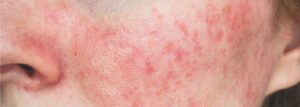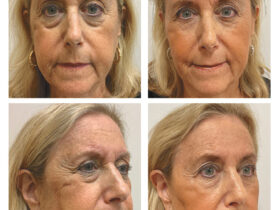By Renee Deneweth, PA – C
 Rosacea Awareness Month is upon us, providing the perfect opportunity to discuss one of the most common skin conditions we see in dermatology.
Rosacea Awareness Month is upon us, providing the perfect opportunity to discuss one of the most common skin conditions we see in dermatology.
Rosacea is most thought of as having rosy cheeks or a red face. There are, however, several variants of rosacea with differing presentations and treatments. Recognizing the difference is essential to properly managing the condition. Facial redness, dilated blood vessels, and flushing are classically seen in erythematotelangiectatic rosacea. In papulopustular rosacea, patients are faced with red, raised, pimple-like bumps on the face. Patients may also have a combination of these types. Other variants include rhinophyma in which patients exhibit changes to nasal tissue, giving the appearance of thick, bulbous skin on the nose, and ocular rosacea which correlates with eye sensitivity and irritation.
The exact cause of rosacea has not yet been identified, though there are many factors that are thought to be involved. Amongst these are skin barrier dysfunction, genetics, the immune system, vascular hypersensitivity, and even microorganisms such as demodex mites. Though the precise cause is unknown, it is important to identify and avoid triggers of rosacea when possible.
The most common triggers include sun exposure, hot or spicy foods, hot or cold weather, alcohol, stress, exercise, and use of topical steroids.
Rosacea is a chronic condition but can be well-controlled with the appropriate treatment regimen. Management begins at home and involves diligent sun protection and
utilization of a gentle skincare regimen including a daily moisturizer to maintain the skin’s protective barrier. Primarily erythematotelangiectatic rosacea is most responsive to laser therapy or oral medications that target vasculature. In the case of papulopustular rosacea, there are several topical and oral antimicrobial and anti-
inflammatory options that are safe and effective. Patients should collaborate with their dermatology provider to select which option is best suited for them.
At Skin Wellness Physicians, we are happy to help you navigate all of your skincare needs (including rosacea). We look forward to seeing you!
Renee Deneweth, PA-C, is a Florida native who was born and raised in Orlando. She obtained her Bachelor of Science degree from Florida Gulf Coast University where she graduated with Honors. Renee gained experience in adult emergency medicine working at Lee Memorial and Health Park emergency departments and obtained licensure as an Emergency Medical Technician. Soon after, Renee’s interest in dermatology was realized as she began working as a medical assistant with Skin Wellness Physicians.
Renee went on to attend PA school at her alma mater, Florida Gulf Coast University, where she graduated with a Master of Physician Assistant Studies degree and was inducted into Pi Alpha, the National Honor Society for Physician Assistants. She has since returned to Skin Wellness Physicians as a Physician Assitant and has been personally trained in General Dermatology and Dermatologic Surgery by Dr. Wasserman, Dr. Tremaine, and Dr. Wong.
Renee is passionate about diagnosing and treating skin conditions in all age groups and ensuring individualized care for each of her patients. She is excited to work with the growing community of Naples!
In her free time, Renee enjoys traveling, exercising, and spending time with friends and family.
239.732.0044
www.SkinWellnessFlorida.com









